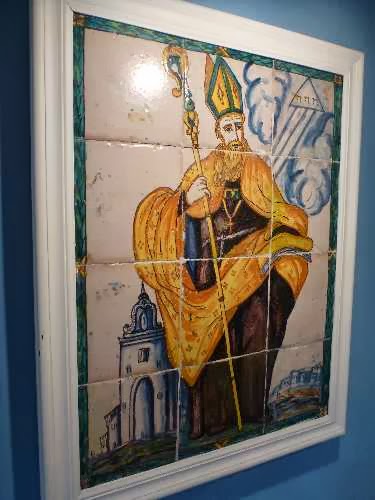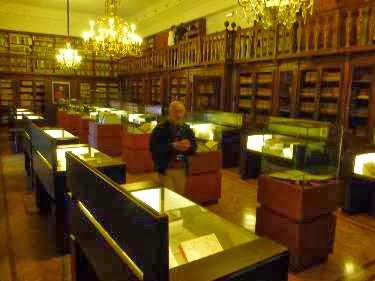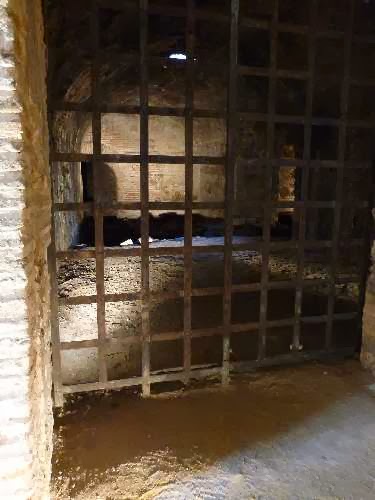Day 10 found us in Toledo after a quick breakfast and a fast
train trip to 70km away Toledo. Toledo was one of the most important cities of
central Muslim Spain. It was the centre for learning and the arts and this was
reflected in the huge number of museums, educational institutions and the most
enormous, architecturally prominent library. Over the years it was a Muslim
centre, then a Christian centre, then a Jewish enclave developed and all had
left their traces on the city.
The train trip was so easy. It was so smooth and the train
was so clean and well designed. We arrived at an incredibly ornate and spacious
station. It felt very Moorish with its architectural details and decoration. It
reminded me of the old banking halls in Collins St Melbourne.
Rather than taking a taxi up the steep hill to the town we
opted to walk and were rewarded with some really beautiful sights as the
buildings up the hill and the swirling river revealed itself as we rounded each
turn. Our entrance to the city walls was over a stone bridge over which hung a
coat of arms and beyond which was a rounded Moorish arch. But there were still
more steep steps, (many more) to get up to the town proper. One last push up
the last hill got us up to the arch leading into the Plaza del Zocodover. But
even before we entered the plaza a wonderful old building caught my eye and we
wandered over. This was the Museum De Santa Cruz. It showed a mixture of Gothic
and Renaissance details. A massive timbered door led us into an internal
courtyard lined with mosaics hundreds of years old. In the centre was a
parterre garden (lined with dwarf box and filled in with violets). A shaggy
olive tree and a stone well reminded us that we were in Spain. There were so
many gorgeous ceramics, tiles, jugs, platters and full painted scenes in the
extensive museum upstairs. In complete contrast there was also a section with
the abstract, nonrepresentational paintings of Lisa. This was an artist that
Juan Carlos and I had never heard of but you could see how he was using the
same influences as Picasso and others to lead the viewer’s feelings with shape
and colour. Throughout the whole building there was such a quiet and
reverential air. It felt lovely to be there.
From here we climbed a few more steps to be met by a stature
of the writer Cervantes looking over the plains behind us as we entered into
the Plaza del Zocodover. This was lined with the traditional tourist shops and
curiously a LOT of marzipan shops (something the area is famed for). This was a
big improvement on past activities, where the townsfolk gathered to watch the
execution of criminals.
Winding streets lined with lots of sword and knife shops led
us up to the Alcazar. This was magnificent! It was originally a Muslim fortress
but the current structure was built as the royal residence for Carlos1. Today
it is a most magnificent central library with the most perfect views across the
city in all directions. There were armchairs set up at the windows on the 8th
floor so we could sit back and take in the unfolding sight as the sun crept
across the town lighting up the colours in the stone and terracotta. We also
managed to wander into one of the research libraries full of rare and precious
book (and photograph one of them) before being discovered by one of the staff
and asked (very politely but insistently) to leave. From the highest level, the
cafeteria, we took some photos of the landscape stretching out to the nearby
hills and some of the enormous country houses that dot them.
It was soon time for coffee and Iberian ham and cheese
baguette at the foot of the Alcazar. Our plan had been to follow the lonely
planet tour but an hour and a half into our time in the city we had only seen
the first station. Toledo was so full of glorious, interesting sights that it
wasn’t possible to take a bad photo or stick to a plan. We tended to follow our
noses rather than the guide book. The Toledo cathedral dated from the 13th
century and though it looked every part a gothic building there was still
something Moorish about the internal decoration. At first we just satisfied
ourselves by looking at the external statues and towers, but later in the day
we found ourselves at the back of the church, which was open to worshippers
rather than tourists and sneaked in there. The naves were so huge that they
were much wider than some Melbourne city streets.
The Jewish quarter was subtly marked with a series of
discrete tiles set into the footpath or in the stones outside houses. I guess
over the years the Jews of the city have learnt to keep a low profile if they
want to keep their heads. Despite its being a Jewish enclave the Christians
made the point that this was a Christian town by building several massive
churches throughout this part of the city.
For hours we wandered up steep laneways and across sleepy
squares. At the bottom of one hill we found the El Greco museum. This was
housed in a complex of buildings that were near El Greco’s original home and
studio and sought to recreate an impression of his life and living conditions, as
well as showing his art and that of the students of his art school.
Throughout the town we found doorways into private
courtyards. Behind the massive walls there were terracotta paved paths,
fountains and gardens often featuring hedges, cycads and lush pots of peace
lilies.
The love of Marzipan was also apparent in the streets where
shops were full of it. The nuns in the local monastery have got into the
marzipan business too and had their own factory and shop.
The Spanish ladies of a certain age could certainly give the
Toorak ladies a run for their money. So many slim, elegantly blonde elderly
women sporting discrete jewellery and immaculately tailored and fur trimmed
coats! Certainly different to the familiar sights on Sydney Road.
Rather than a big meal in the middle of the day we opted for
little snacks throughout the day, stopping for a drink or a nibble as the mood
took us. In the late afternoon, in the shadow of the Toledo cathedral, we
stopped for a beer and a snack. It was really pleasant and snoozy weather so we
sat outside. When Johnny went to pay, the guy would only charge us for the
beer.
The houses and shops of Toledo literally clung to the side
of the mountain and the streets simply had to dribble between them much as a
creek would as it worked its way down a hill. Despite the fact that the streets
were very narrow, steep and twisting there were cars that tried to negotiate
them. Gratefully, most of the cars were parked outside the city walls, down by
the railway station in what looked like a large park and ride area. By the
afternoon, people, who we assume were retrning home from work started to claim
the roads that twisted through Toledo and several times Johnny and I had to
jump on to a doorway step to avoid being slapped by a wing mirror.
It was a slow walk back to the train station (gratefully all
downhill) and an amazingly fast ride back to Madrid. I’d had enough of walking
so we opted for Japanese take-away and a beer in our room. Perfect.





























































































































